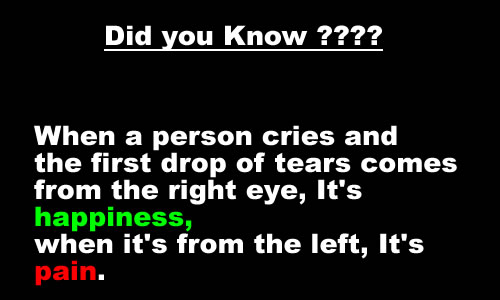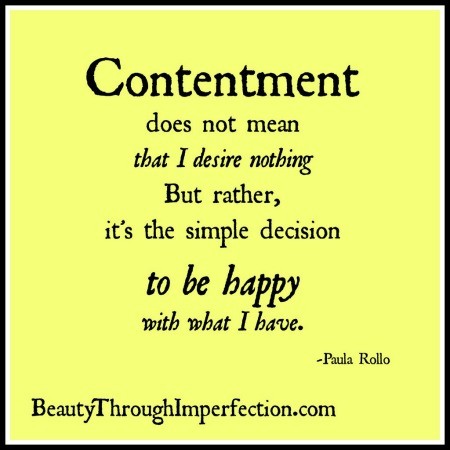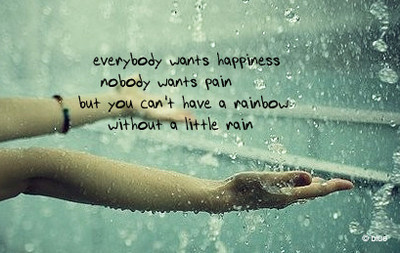| Topic: Mind-Teasers :-) | |
|---|---|

|
|
|
|
|






|
|
|
|
|
 
|
|
|
|
|
|
A man was walking across the road when he met with an accident. The impact was on his head which caused him to be in a coma for 2 days.
When he opened his eyes, his wife was by his side. He told her (in tears), "When I was struggling with my studies in the University, I failed again and again. Sometimes I even have to re-take my papers. You were there by my side, encouraging me to go on trying." She squeezed his hands as he continued, "When I went for major interviews and failed to clinch any of the jobs, you were there, cutting out the job ads for me to apply..." He added, " ...then I started working in this little firm and finally got a big contract. I blew it because of a small mistake. But you are still there for me." His wife was in tears. The man said, "I finally got a job after being laid off for quite some time. But I never seem to be promoted and my hard work was not recognized. I remained in the same position from the day I joined the company till now. You are still beside me..." His wife's tears trickled down as she listened to him, "And now I met with an accident and when I woke up, you are here with me. There's something I really like to say to you..." She flung herself on the bed and hug her husband, sobbing with deep emotion. Finally her husband said,......"I think you bring me bad luck!" [Source: 'Anonymous']       
|
|
|
|
|
|
Edited by
Kaustuv1
on
Sun 05/10/15 04:01 AM
|
|
|
"A Philosophy of Fear" [by 'Lars Svendsen']
'Mark Frankel' thinks 'fearfully': We can philosophize about anything, even fear. Actually, that's not so surprising, as from earliest times philosophers have thought about fear, anger and the other emotions. This book by a Norwegian professor looks at the classic ethical conflict of the emotions and reason, but it is also a piece of contemporary polemics about the politics of fear. These polemics are the result of the author's increasing irritation at the colonization of our lives by fear. Professor Svendsen aims some crisply expressed criticisms at those politicians who exaggerate the threat of terrorism to erode our human rights, and at the scare-mongering media which corrupt our understanding with sensationalized half-truths. His complaint is a familiar one. In the UK, the US and elsewhere, concerns have been raised about governments' attempts to unmask and restrain terrorists, from phone-tapping and detention without trial to outright kidnapping and torture. Because opposition to these measures has been vocal, governments in the UK and US rejected some of the more extreme measures adopted by their predecessors. Svendsen argues that while it's obvious that terrorism must be combated, it is equally obvious that this need is insufficient to justify disregarding basic human rights. There are questions to be asked about what constitutes a basic human right, and moreover, what constitutes disregarding them, but Svendsen claims the authority of Benjamin Franklin, who said "They who would give up an essential liberty for temporary security deserve neither liberty or security." Svendsen is not just concerned with the reaction to 9/11. Rather, his point is that it is wrong in principle for politicians to exploit fear, and for the media to pander to their unscrupulousness. Yet not all politicians are like this. Franklin D. Roosevelt said "The only thing we have to fear is fear itself" – and he had better reason than most to preach the politics of fear, faced as he was by destitute masses at home and powerful tyrants abroad. And like FDR, Svendsen says we ought to fear fear, because it undermines so much of what is really important in our lives. Politicians who with an eye to history ignore this message, may find that history judges them differently from the way they intended. Once the media finds another issue to sensationalize and the caravan moves on, more sober judgments are possible, common sense reasserts itself, and the public go about their business fearful not of wild-eyed terrorists, but now of unemployment, death by natural causes, or environmental degradation. 'The Tyranny Of Fear': Svendsen claims our lives are being increasingly colonized by fear; but George W. Bush and Tony Blair et al hardly compare with other fear-mongers, particularly that archetypal merchant of fear, Joseph Stalin. What made Stalin so frightening was not that he sought to induce fear in his enemies, and so inadvertently oppressed his friends, but that he sought to terrify loyal supporters. As Solzhenitsyn shows us, the gulags were full of Bolsheviks who believed in kindly Uncle Joe and blamed their suffering on trickery by his counselors. In fact, though, Stalin waged a war against his own people, partly to guard against the off-chance they might turn against him. It is tyrannies not democracies which thrive on the politics of fear. If Svendsen had moved beyond contemporary polemics and taken a longer historical perspective, he would also have made more of the scope for religion to play on fear. There is a paradox in mainstream Christianity, for example, which is presented as a religion of love, but which alienates with its dogmas and backs up fears of the temporal world with threats of Hell-fire to come. Nowadays we do not hear so much from priests and bishops about the threat of damnation, perhaps because educated opinion is repelled by such blatant manipulation. Progressive religious voices instead usually lend themselves to a polemics of trust. Svendsen is able to write about fear as he does partly because philosophers like Onora O'Neill have written about its opposite, trust, as the cement of civil society. Certainly, civilization needs trust, not fear. As a reduction ad absurdum argument [i.e. one showing its premises must be false because of its impossible conclusions], in a totalitarian society where fear is universal and everyone were to deceive everyone else, then there could be no trust or reliance on others' communications, hence nobody could deceive anyone else. This society would cease to function. But this is a mere thought-experiment. In reality, the more likely outcome of totalitarianism is a atmosphere of suspicion and fear in which friends and family members do betray each other and life becomes poisoned. Clearly, trust and openness walk hand in hand down the sunny side of the street, while fear and betrayal skulk together in the shadows. 'Truth Management': Philosophers can be classified according to whether they have an optimistic or a pessimistic political philosophy. For the optimists civil society is engendered by trust, reason and respect for the individual, and by shared interests. The pessimists think we hang on to nurse for fear of so much worse. Fearful philosophers include Machiavelli and Hobbes, who are pessimists as regards all states of society, while the romantics Rousseau and Marx posit an unobtainable utopia, which amounts to pessimism about the present. Aristotle, Spinoza, Locke, Hume, Kant and Rawls are also optimists, although curiously Spinoza and Kant had a poor opinion of the moral integrity of their fellow citizens, and Aristotle had no notion of the rights of the individual. Adorno and Horkheimer recognized this dualism in the Western tradition when they wrote of "those somber writers of the bourgeois dawn 'Machiavelli, Hobbes, Mandeville and so on' who decrying the egotism of the self, acknowledged in so doing that society was the destructive principle, denouncing harmony before it was elevated as the official doctrine by the serene and classical authors"(Dialectics of Enlightenment). Svendsen is amongst the serene and classical, despite his barbs against our leaders. He thinks fear can be controlled. Fear may be irrational in the sense that it makes us prey to manipulation, but can be rationally appraised and managed. Thus the enemy of fear-mongering politicians and Hell-fire preachers is informed and alert public opinion that is, a body of opinion-makers who understand that the threats for which fear may be the immediate reaction are measurable, and can be controlled. There is already an evidence-based risk-assessing policy-making industry which, Svendsen reassures us, can put our minds at ease in the face of media-induced frenzies about terrorism, credit crunches, epidemics, alien abductions, and the collapsing moral fiber of the nation. But the complementary industries of risk-management and think-tank policy generation are strangely unaccountable. Who measures the risks this poses? Quis custodiet ipsos custodes? The credit rating agencies got the banking crisis wrong; and that crisis was induced by risk-mitigating financial instruments designed to turn bad debts into good ones. In manufacturing and industry the worry is that risk management and value-engineering is only about reducing environmental standards while maximizing profit. Capitalism is always trying to keep one step ahead of the regulator, and the risk-management industry is no exception. The informed and studied control of risk may alleviate fears, but should not allow complacency about genuine dangers. 'Emotional Responses': In addition to contemporary polemics, Svendsen deals with classic philosophical issues concerning the emotions. Western wisdom about the control of our emotions goes back at least as far as the Stoics. Their basic ideas had been independently discovered by the Buddha, who developed a philosophy also based on understanding dissatisfaction and controlling the emotions. But there has been a counter-trend against the ancient recognition of ourselves as creatures prone to natural feelings and impulses. John MacMurray, a sage of the 1930's, but now largely forgotten, wrote "Reason is the capacity to behave consciously in terms of the nature of what is not ourselves" (Reason and Emotion p.19). The stark distinction between emotion and reason, influenced by 'Freud', contrasts with the evergreen view of 'Aristotle' that reason is itself as much a product of our biology as fear, anger, lust and the allegedly irrational emotions. The corresponding neo-Aristotelian, anti-Freudian essentially humanist view, recognizes that we flourish when we conform with what is natural, since what is truly natural is best. Svendsen points out the difficulty of distinguishing between the biological, physiological and social aspects of emotions, as all emotions have a biological basis but are shaped by individual experiences as well as by social norms. Fear has a stronger biochemical component than some other emotions, and there is little to be done by reason if really strong fear takes hold. If one is truly afraid, one cannot simply choose to have a more comfortable emotion. Nevertheless, generally speaking, we can bring our reason to bear on our emotions. For example, we can avoid placing ourselves in situations where we know we are likely to be afraid, such as high places. We also possess a limited ability to control our emotions, and to improve our ability to do so by practice, such as controlling a tendency to panic from fear. We may not be able to completely master our emotions, but we can understand them and be alert to how they may be both exploited and moderated. Such is the message of the ancient philosophers, brought up to date by this wide-ranging and thought-provoking book 'a companion to the author's "A Philosophy of Boredom!"' Svendsen's message is that we ought to go beyond fear. That message is good. My only criticism of A Philosophy of Fear is a pedantic one, that some of the references are not fully translated from the original Norwegian. The English reader will puzzle to identify, for example, the title of the essay by Montaigne, which is referenced as 'Om drukkenskap'. The study of fear and the other emotions is not the preserve of psychotherapists or professors of philosophy. Rather it is done by any thoughtful person who meditates upon his or her own feelings, thoughts and actions. '� Mark Frankel 2011' PS: Mark Frankel is a professional financier and amateur philosopher from Kingston-upon-Thames. 
|
|
|
|
|
|
"Some Funny Musings Posted to a few Mailing Lists By a Blind Woman":
[She was likely to have been posting them using software with a synthesized voice that audibly reads what it says on the screen, 'invented so blind people can use the computer'.] As my guide dog [Shadow] and I stood in line at the checkout of the River City Market at 'Hamburg', I asked the cashier what I considered a simple question. "Where are the napkins please?" Her response was hurried, but sincere, "over there." Emerging from the light rail for the first time, I managed to catch the attention of a passer-by. "Please sir, can you tell me where I might catch bus 63?" A kind voice offered a pleasant response before disappearing into the cacophony of the early afternoon, 'You can catch it, 'Over there.'" So many things reside over there -- napkins, bus stops, pencils, pens, clothing racks, department stores and even my shoes! A never ending supply of important and indispensable items and locales all reside in this place which is shrouded in mystery and intrigue. I stand in perplexed silence after learning that something is 'over there'. It is a place I have never been and have no hope of finding on my own. My guide dog is quite skilled in finding chairs, stairs, elevators, escalators, helping me cross streets, and can even find me the Diet Pepsi display at Food Town; however, when I tell her to find "over there" her little bottom hits the floor and a small whimper tells me that she is as confused as I. We will not be going "over there" today. 'Over there' has caused me a bit of vexation, a lot of confusion and, on more than one occasion, made my heartbeat 'race'. I have discovered that "over there" can be a dangerous place. One day, while crossing a street, I heard a driver's irritated voice shout out a warning of a truck bearing down on me from 'over there'. Shadow artfully dodged the oncoming vehicle and pulled me to the safety of the curb. Our hearts were both racing as we took a few moments to compose ourselves. Close encounters with over there can be frightening experiences. Although many blind people have wondered as to the exact location of, "over there," few have dared to venture forth in an actual exploration of the mysterious place. One day, while standing in line at the supermarket, I asked the clerk where I might find the aspirin. With a cheery smile in her voice, she informed me that the aspirin was located, "over there." With a weary sigh, I decided that I would take the extra step that would unravel the mystery, which had vexed my compatriots since the beginning of time. Taking a deep breath, and attempting to look 'nonchalant', I smiled at the clerk, "Where," I asked, "is 'over there'?" I imagined the girl's shocked expression. I felt her sharing condescending and concerned looks with her fellows in the store. The silence grew palpable as they mulled the possibility of allowing a blind person access to the 'forbidden land'. She had no choice; she would have to tell me how to find "over there!" I had won! Exhilaration swept through me as I waited in breathless anticipation. A victorious smile crept to my lips, my hand tightened on the handle of Shadow's harness, we would eventually be going 'over there'! The clerk's voice reeked with resignation as the decision was made. "That way," she said.    
|
|
|
|
|
|
'Note To Self':


|
|
|
|
|

         
|
|
|
|
|

     
|
|
|
|
|


|
|
|
|
|
|
"Tribute to Mother": [by 'Frances Johansan']
You painted no Madonnas on chapel walls in Rome But with a touch divine you lived one in your home You wrote no lofty poems that critics counted art But with a nobler vision you lived them in your heart You carved no shapeless marble into some high soul design But with a finer sculpture you shaped this soul of mine You built no great cathedrals that centuries applaud But with a grace exquisite your life's a Cathedral God Had I the gift of Raphael or that of Michelangelo Oh, what a rare Madonna my mother's life would show! 


"Wonderful Mother" [by 'Pat O'Reilly'] God made a wonderful mother, A mother who never grows old; He made her smile of the sunshine, And He moulded her heart of pure gold; In her eyes He placed bright shining stars, In her cheeks fair roses you see; God made a wonderful mother, And He gave that dear mother to me! PS: To all the wonderful 'Mothers' who have been an 'embodiment' of 'Love' 'Care' and 'Sacrifice' throughout all ages....!   
|
|
|
|
|

"Let Your Light Shine": [by 'Ellen Bailey'] Does the light of your soul still shine? Is it still a beacon that others can find? Or does a guilty conscience cover it like a film Dulling its rays and causing it to look dim? Do you tell yourself everything is just fine Ignoring the needs of others as if blind? What about those who have gone astray? And those who are lonely and afraid? Search your heart and see what you find Ask yourself if you have been unkind Good deeds alone will not get you into Heaven Extend a helping hand to your fallen brethren It will clear your conscience and erase your sins And the light of your soul will be bright again Others will look upon you as a beacon of hope As down life's road they struggle and cope!   

|
|
|
|
|


'Happiness-A Search Within': [By 'Palas Kumar Ray'] Wants are fire Flames are woe Happiness is a flower nourished by a shower How can they live together do? Money is honey which you earn for need. Which you earn by labor Gives you happiness flavor Makes you happy indeed. Look at the eyes of a mother As she feeds her kids. Look at her she nurture! How pretty the sculpture! Look, look, how happiness breeds! No one can make you happy Happiness is a search within. as long as you sow the seeds of grief and woe you are caught between! � Palas Kumar Ray.All rights reserved. 

  
|
|
|
|
|
|
Edited by
Kaustuv1
on
Mon 05/11/15 05:13 AM
|
|

One day, father was doing some work and his son came and asked, "Daddy, may I ask you a question?" Father said, "Yeah sure, what is it?" So his son asked, "Dad, how much do you make an hour?" Father got bit upset and said, "That's none of your business. Why do you ask such a thing?" Son said, "I just want to know. Please tell me, how much do you make an hour?" So, the man said, "I make 500 $ per hour." "Oh!", the little boy replied, with his head down. Looking up, he said, "Dad, may I please borrow 300 $?" The infuriated father retorted, "if the only reason you asked about my pay is so that you can borrow some money to buy a silly toy or other nonsense, then march yourself to your room and go to bed. Think why you are being so selfish. I work hard every day and do not like this childish behavior." The little boy quietly went to his room and shut the door. The man sat down and started to get even angrier about the little boy's questions. How dare he ask such questions only to get some money? After about an hour or so, the man had calmed down, and started to think, "Maybe there was something he really needed to buy with those 300 $ and he really didn't ask for money very often!" The man went to the door of little boy's room and opened the door. "Are you asleep, son?" He asked. "No daddy, I'm awake," replied the boy. "I've been thinking, maybe I was too hard on you earlier", said the man. "It's been a long day and I took out my aggravation on you. Here's the 300 $ you asked for." The little boy sat straight up, smiling. "Oh! thank you dad!", He yelled. Then, reaching under his pillow he pulled some crippled notes. The man, seeing that the boy already had money, started to get angry again. The little boy slowly counted out his money, then looked up at his father. "Why do you want money if you already have some?" the father grumbled. "Because I didn't have enough, but now I do," the little boy replied. "Daddy, I have 500 $ now. Can I buy an hour of your time? Please come home early tomorrow. I would like to have dinner with you....!"The father kept standing, staring at his son, 'speechless'! Moral: It's just a short reminder to all of you working so hard in life! We should not let time slip through our fingers without having spent some time with those who really matter to us, those close to our hearts. If we die tomorrow, the company that we are working for could easily replace us in a matter of days. But the family & friends we leave behind will feel the loss for the rest of their lives. And come to think of it, we pour ourselves more into work than to our family... Submitted By: Alan, Australia! 
|
|
|
|
|
|
Note To Self:


|
|
|
|
|

  
|
|
|
|
|








                                       
|
|
|
|
|
|
A man and his wife were going for a stroll one night when they spotted what was obviously a blind man taking a walk on the other side of the street with his seeing eye dog. "Wow! Isn't that something!" remarked the wife, "look at that man taking a stroll just like us." They continued strolling for a few minutes longer when they heard the man let out a loud yelp. The dog had walked him right into a parked car and he had clearly banged his shin pretty hard. Rushing over to help, they were surprised to see the man reach into his pocket and pull out a treat for the dog. "Isn't that weird?" whispered the wife, "giving him a treat even when he's mad." "Why are you giving him a treat?" questioned the husband. "I AINT GIVING HIM A TREAT!" retorted the enraged man, "I'M JUST TRYING TO FIND OUT WHERE HIS HEAD IS, SO I CAN GIVE HIM A SHARP KICK ON HIS REAR!"

|
|
|
|
|
|
Note To self:


|
|
|
|
|


|
|
|
|
|






